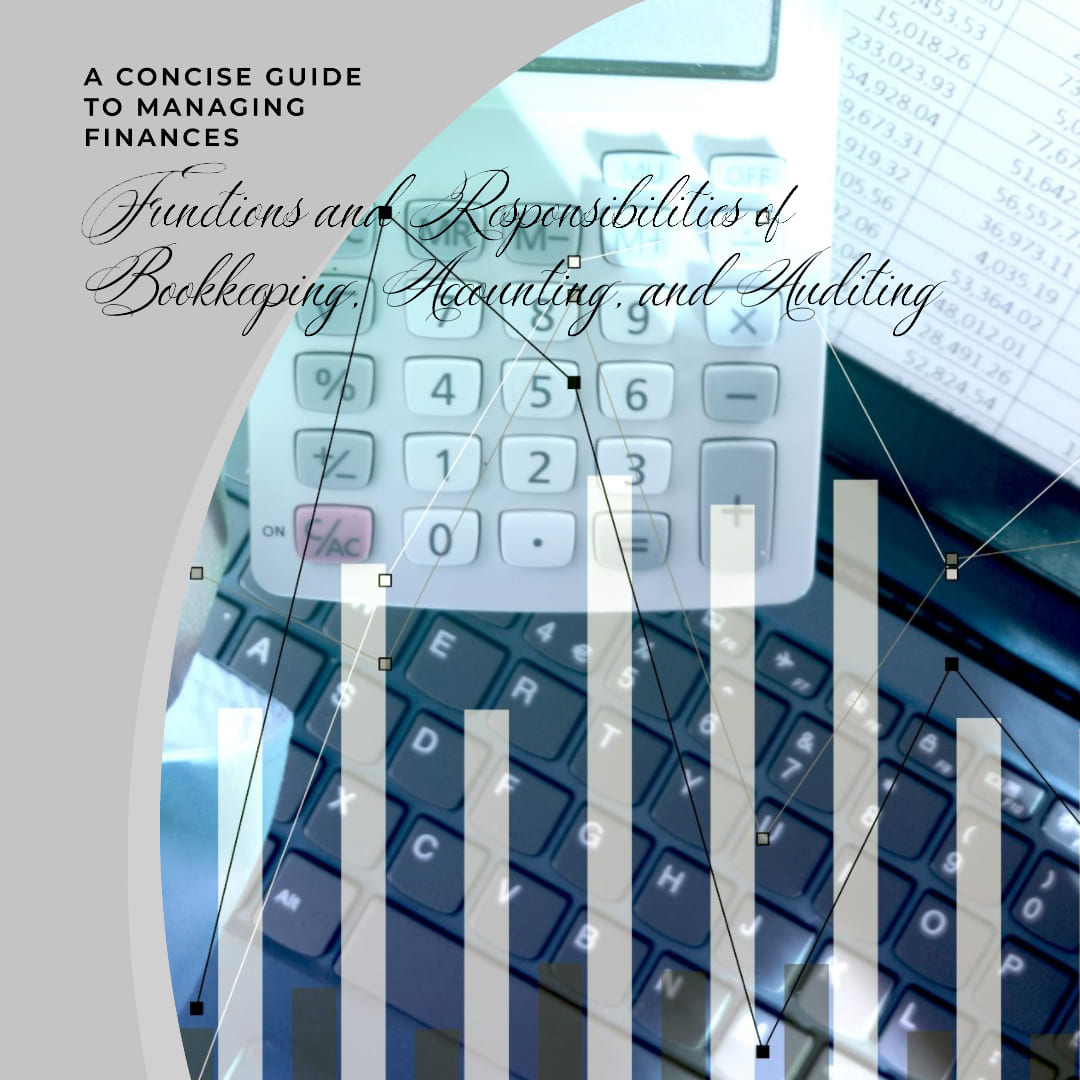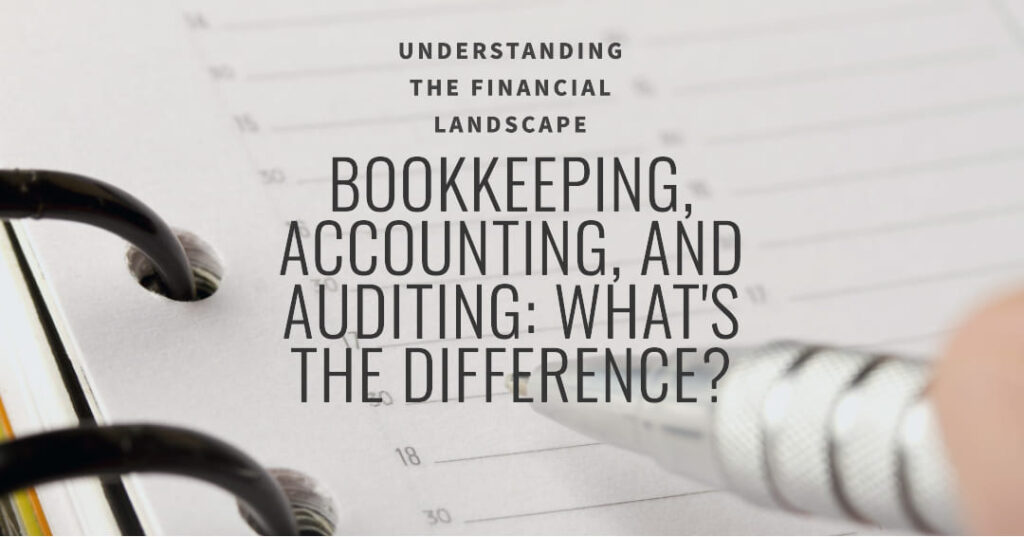Bookkeeping, accounting, and auditing are three essential components of financial management in businesses and organizations. Bookkeeping involves recording and maintaining accurate financial transactions, such as sales, purchases, and payments. Accounting involves analyzing, classifying, and interpreting financial data to provide insight into the financial performance of a business. Auditing involves reviewing and evaluating financial records to ensure compliance with accounting standards and regulations. These three functions are interrelated and are essential for effective financial management.
 Functions and Responsibilities
Functions and Responsibilities
The functions and responsibilities of bookkeeping, accounting, and auditing are as follows:
Bookkeeping:
- Recording daily financial transactions
- Maintaining accurate financial records
- Creating financial reports such as balance sheets and income statements
- Managing accounts payable and receivable
- Reconciling bank statements and other financial documents
Accounting:
- Analyzing financial data
- Preparing financial statements and reports
- Creating and managing budgets
- Managing tax compliance and preparation
- Providing financial advice and recommendations
- Conducting financial audits
Auditing:
- Reviewing financial statements and records
- Ensuring compliance with accounting standards and regulations
- Identifying financial risks and potential fraud
- Conducting internal and external audits
- Providing recommendations for improving financial processes
- Reporting findings to management and stakeholders.
Overall, bookkeeping provides the foundation for accounting, which in turn informs auditing. Together, these functions help ensure that businesses and organizations maintain accurate and reliable financial information, meet legal and regulatory requirements, and make informed financial decisions.
Educational Requirements and Certifications
Educational requirements and certifications for bookkeeping, accounting, and auditing are as follows:
Bookkeeping:
- Typically, a high school diploma or equivalent is required
- Postsecondary education in accounting or bookkeeping is helpful but not always required
- Optional certifications include Certified Bookkeeper (CB) from the American Institute of Professional Bookkeepers (AIPB) or Certified Professional Bookkeeper (CPB) from the National Association of Certified Public Bookkeepers (NACPB)
Accounting:
- A bachelor’s degree in accounting or a related field is typically required
- Certified Public Accountant (CPA) certification requires a minimum of 150 semester hours of education and passing the Uniform CPA Exam
- Other certifications include Certified Management Accountant (CMA) and Certified Internal Auditor (CIA)
Auditing:
- A bachelor’s degree in accounting, finance, or a related field is typically required
- Certified Internal Auditor (CIA) certification requires passing the Certified Internal Auditor Exam and meeting experience and education requirements
- Other certifications include Certified Information Systems Auditor (CISA) and Certified Fraud Examiner (CFE)
- Certification can demonstrate competence and professionalism in the respective field and may be required or preferred by employers. However, education and experience are also essential for success in bookkeeping, accounting, and auditing.

Job Roles and Career Paths
Job roles and career paths in bookkeeping, accounting, and auditing are as follows:
Bookkeeping:
- Bookkeeper
- Accounting Clerk
- Payroll Specialist
- Accounts payable/receivable clerk
- Tax preparer
- Career paths in bookkeeping may include advancing to an accounting role or specializing in a specific industry or type of bookkeeping, such as payroll or accounts payable.
Accounting:
- Staff Accountant
- Financial analyst
- Senior Accountant
- Accounting manager
- Controller
- Career paths in accounting may include advancing to a management or executive role, specializing in a specific area of accounting, such as tax or audit, or pursuing a career in finance.
Auditing:
- Internal auditor
- External auditor
- Forensic accountant
- Risk management specialist
- Compliance officer
- Career paths in auditing may include advancing to a management or executive role, specializing in a specific audit area, such as information systems or fraud, or pursuing a career in risk management or compliance.
Overall, career paths in bookkeeping, accounting, and auditing can vary depending on the individual’s education, experience, and interests. However, all three fields offer opportunities for advancement and specialization, as well as a path to executive-level positions in finance and accounting.
| Point | Bookkeeping | Accounting | Auditing |
| Definition | Recording financial transactions. | Preparing financial statements and reports. | Reviewing financial statements and reports. |
| Functions | Records transactions. | Analyzes and interprets financial data. | Provides assurance on financial reporting. |
| Responsibility | Accurate financial record keeping. | Providing financial information. | Ensuring financial information is accurate. |
| Education | High school diploma or equivalent. | Bachelor’s degree in accounting or finance. | Bachelor’s degree in accounting or finance. |
| Certifications | None required. | Certified Public Accountant (CPA). | Certified Internal Auditor (CIA). |
| Tools and software | Spreadsheet and accounting software. | Accounting and tax preparation software. | Audit management and data analysis software. |
Similarities:
- All three fields are related to financial transactions and records.
- All three fields require knowledge of accounting principles and financial reporting standards.
- Professionals in all three fields play a role in ensuring financial compliance and accuracy.
Differences:
- Bookkeeping primarily involves recording financial transactions, while accounting involves analyzing and interpreting financial data, and auditing involves providing assurance on financial reporting.
- The education and certification requirements for accounting and auditing are typically higher than those for bookkeeping.
- The tools and software used in each field can vary based on their specific functions and responsibilities.
Relationship between Bookkeeping, Accounting, and Auditing
Accounting, accounting, and auditing are interrelated fields supporting financial record keeping, reporting, and compliance.
Bookkeeping is the foundation of accounting and involves recording financial transactions in a systematic manner. The bookkeeping process provides accurate and complete financial data for accounting analysis and interpretation. Accounting involves analyzing financial data and using it to prepare financial statements and reports that are used by businesses to make informed decisions. The accounting process helps businesses manage their finances, understand their financial position, and comply with financial reporting standards and tax regulations.
Auditing is a process that provides assurance of the accuracy and completeness of financial statements and reports prepared by accounting professionals. Auditors review financial records, analyze financial data, and test internal controls to ensure that financial information is reliable and accurate. The auditing process also helps identify potential areas of fraud, waste, or abuse and provides recommendations for improving financial management practices.
In summary, bookkeeping provides the foundation for accounting, which in turn supports the auditing process. These fields are interdependent and work together to support financial integrity, compliance, and informed decision-making.
Key Performance Indicators and Metrics
Key performance indicators (KPIs) and metrics are used to measure and evaluate the performance and effectiveness of bookkeeping, accounting, and auditing activities. Here are some examples of KPIs and metrics for each field:
Bookkeeping:
- Accuracy of financial records and transactions.
- Timeliness of financial record keeping and reporting.
- Cash flow management and forecasting.
- Compliance with tax regulations.
Accounting:
- Revenue and profit margins.
- Financial ratios, such as debt-to-equity and return on investment.
- Cost management and efficiency.
- Compliance with financial reporting standards and regulations.
Auditing:
- Accuracy and completeness of financial statements and reports.
- Effectiveness of internal controls and risk management practices.
- Compliance with auditing standards and regulations.
- Recommendations for improving financial management practices.
KPIs and metrics are important for evaluating the success of bookkeeping, accounting, and auditing activities and identifying areas for improvement. By monitoring and measuring key indicators of performance, businesses and organizations can make informed decisions, improve financial management practices, and maintain financial integrity and compliance.

Future Trends and Developments
Here are some future trends and developments that may impact bookkeeping, accounting, and auditing:
- Automation and Artificial Intelligence (AI): With advancements in technology, bookkeeping and accounting tasks are becoming increasingly automated. AI-powered tools can perform routine tasks, such as data entry and reconciliation, freeing up time for accounting professionals to focus on higher-level tasks such as analysis and decision-making.
- Cloud Computing: Cloud-based accounting and bookkeeping software have made it easier for businesses to manage their finances from anywhere, at any time. The cloud enables real-time collaboration between bookkeepers, accountants, and their clients.
- Blockchain Technology: Blockchain technology has the potential to revolutionize auditing by creating an immutable ledger of transactions that can be verified independently. This can help improve the accuracy and transparency of financial reporting.
- Increased Regulation: As financial regulations become more complex and extensive, bookkeepers, accountants, and auditors will need to keep up-to-date with changes and be able to demonstrate compliance.
- Sustainability Reporting: As more businesses focus on environmental, social, and governance (ESG) issues, there will be an increasing demand for sustainability reporting. Accounting professionals will need to be able to provide accurate and reliable ESG data to support decision-making.
- Data Analytics: As data becomes more abundant and complex, there will be an increasing need for accounting professionals who are skilled in data analysis and able to use data-driven insights to support decision-making.
Overall, the future of bookkeeping, accounting, and auditing is likely to be shaped by technological advancements, changing regulatory environments, and evolving business priorities. It will be important for professionals in these fields to stay up-to-date with these developments and adapt their skills and practices accordingly.



